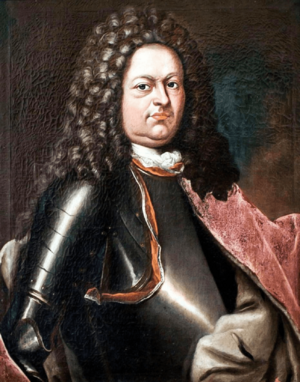Johann Ernst, Count of Nassau-Weilburg facts for kids
Quick facts for kids
Johann Ernst of Nassau-Weilburg
|
|
|---|---|

Johann Ernst of Nassau-Weilburg
|
|
| Born | 13 June 1664 Weilburg |
| Died | 27 February 1719 (aged 54) Heidelberg |
| Noble family | Nassau |
| Spouse(s) | Maria Polyxena of Leiningen-Dagsburg-Hartenburg |
| Father | Frederick, Count of Nassau-Weilburg |
| Mother | Christiane Elisabeth of Sayn-Wittgenstein |
Johann Ernst of Nassau-Weilburg was an important German prince and military leader. He was born in Weilburg on June 13, 1664. He passed away in Heidelberg on February 27, 1719.
He started as a Count in 1675. Later, in 1688, he became a Prince (Fürst) of Nassau-Weilburg. He was also a very high-ranking general in the army, called an Imperial Generalfeldmarschall.
Life of Johann Ernst
Johann Ernst was the oldest son of Frederick, Count of Nassau-Weilburg and Christiane Elisabeth of Sayn-Wittgenstein. His parents both died when he was young. Because of this, other counts, Johann of Nassau-Idstein and later Johann Louis of Nassau-Ottweiler, helped rule his lands until he was old enough.
In July 1679, Johann Ernst began studying at the University of Tübingen. From 1681 to 1682, he even spent time at the court of King Louis XIV of France at the famous Palace of Versailles.
Johann Ernst became the only ruler of Nassau-Weilburg in 1684. This happened after his brother, Frederick William Louis, was killed during a battle in Buda. At one point, France took over some of his lands. However, these lands were given back to him after the Treaty of Ryswick in 1697.
Military Career
Johann Ernst had a very important career in the military. In 1684, he led a Dragoon regiment for the Landgraviate of Hesse-Kassel.
When the Nine Years' War began in 1688, he bravely defended the city of Koblenz. He also took part in several major battles. These included the Siege of Mainz in 1689, the Battle of Fleurus (1690), and the Battle of Landen in 1693.
In 1696, Johann Ernst started working as a general for the Electoral Palatinate. This made his old employer, Charles I, Landgrave of Hesse-Kassel, very angry. After the war ended with the Peace of Ryswick, Johann Ernst became the governor of Düsseldorf.
When the War of Spanish Succession started in 1701, Johann Ernst quickly put together an army. He helped win the Siege of Landau in 1702. He also helped chase away a French army led by Marshal of France Tallard. Because of these successes, he was made an Imperial Generalfeldmarschall, a very high military rank.
In 1703, another important general, Prince Eugene of Savoy, marched to Bavaria. Johann Ernst stayed near the Rhine River to protect Landau from Tallard. This led to a terrible battle on November 15, 1703, called the Battle of Speyerbach. His army lost 8,000 men. Sadly, his oldest son, Colonel Frederick Ludwig, was also killed in this battle. After this defeat, Johann Ernst never fought in a major battle again. He left active military service completely in 1706. He then served as a high-ranking official for the Elector Palatinate until 1716. He returned to Weilburg, where he passed away in 1719.
Building Projects
In the 1700s, Johann Ernst started a big project. He expanded his home, Schloss Weilburg. He changed it from an old Renaissance palace into a grand Baroque complex. He added beautiful buildings like orangeries (for growing citrus trees), stables, a church, and lovely terrace gardens.
Family Life
Johann Ernst married Countess Maria Polyxena of Leiningen-Dagsburg-Hartenburg on April 3, 1683. She was born on February 7, 1662, and died on April 22, 1725.
They had nine children together:
- Frederick Louis (1683–1703), who was killed in the Battle of Speyerbach.
- Charles August (1685–1753), who later became a prince. He married Princess Auguste Friederike Wilhelmine of Nassau-Idstein.
- Maria Polyxena (1686–1687)
- Johanna Louise (1687–1688)
- Charles Ernst (1689–1709)
- Henry Louis (1690–1691)
- Magdalena Henriette (1691–1725), who married Frederick William, 1st Prince of Solms-Braunfels.
- Albertina (1693–1748)
- A daughter (1694)
See also
 In Spanish: Juan Ernesto de Nassau-Weilburg para niños
In Spanish: Juan Ernesto de Nassau-Weilburg para niños

